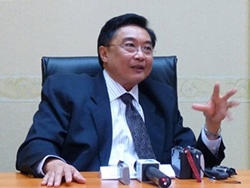Sorajak Kasemsuvan, chairman of MCOT Plc, was last week selected as president of Thai Airways International, succeeding Piyasvasti Amranand, whose employment contract was abruptly terminated by the THAI Board of directors in May.
THAI board of directors chairman Ampon Kitti-ampon said Sorajak was the only candidate qualified by the selection panel and he also was interviewed by the panel.
 Sorajak Kasemsuvan
Sorajak Kasemsuvan
He said Sorajak will be informed of the board’s decision, appointing him as THAI president, after which a negotiation for salary and other benefits will be done between him and Finance Ministry representatives.
The board of directors, Ampon said, must inform the Transport Ministry of the employment after which it will be forwarded to the Cabinet for approval. Sorajak will become THAI’s 16th president.
Sorajak, a PhD recipient in international law from London School of Economics, was president of MCOT Plc in 1999 but resigned before his four-year term expired. He returned to MCOT late last year as chairman of the board of directors.
In between, he had served as vice minister to Foreign Minister Surakiat Sathirathai. He started working for the Foreign Ministry after receiving his doctorate from the University of London.
Meanwhile, some 100 THAI employees, led by labor union leader Jaemsri Sukchoterat, rallied at the lobby of THAI headquarters to demand a change in the employment contracts of temporary workers, who are hired on two-year, four-year or five-year basis. They called on the management to review workers’ employment contracts to entitle them to work with THAI until the compulsory retirement age of 60 – and not on short terms.
If their demand is not met, the demonstrators said, they would lodge a complaint with the National Human Rights Commission, the House standing committee on labor and the prime minister.
Ms Jaemsri said more than 2,500 Thai workers have been hired on a contract basis when they should be employed until the required 60-year-old retirement age given the professional specialties and exclusivities of their jobs, such as ground and inflight services, and equipment sourcing.
These are the jobs that need experienced people, and not employees who work for a short term, she said.
The labor union’s demand will probably be one of the issues in the ‘list of challenges” pending the new president’s action.




